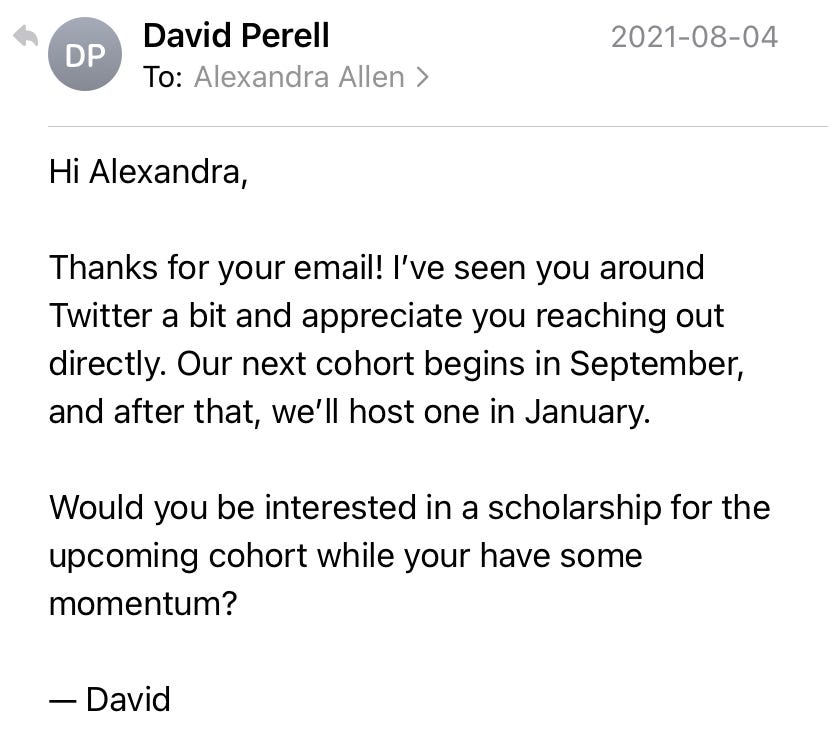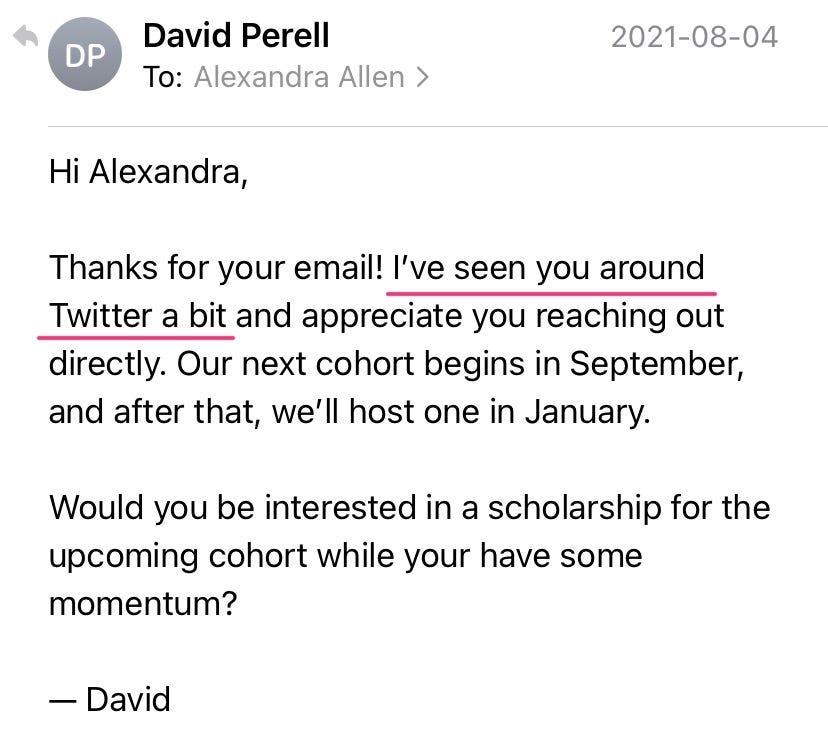Four Life Hacks From The Ultimate Online Community
Write of Passage is ending. But its life-changing magic lives on.
Hey, it’s Alexandra. Welcome to my weekly newsletter where I share my latest reflections on professional development and well-being.
If you’re not a subscriber, here’s what you missed recently:
Subscribe to get future posts emailed to you:
In today’s post, I share four life hacks guaranteed to brighten your future (inspired by Write of Passage—the ultimate online community):
Send cold emails.
Embrace being bad.
Avoid regrets.
Keep putting yourself out there.
☕️ Read time: 7 mins (best with tea or coffee)
Last week, I was gutted to hear Write of Passage—the elite online writing course and community I’ve been part of for the past three years—is ending. Founder and writing advocate extraordinaire, David Perell, announced the news on Monday.
Write of Passage was life-changing for me.
Full stop.
I first joined in September 2021 and it unleashed the writer in me that was dying to get out. Three years later, I’m still writing strong.
It’s not just my archive of 144 posts I’m proud of, or the fact that I found the courage to hit ‘Send’ 144 times—even on days when I felt like I couldn’t or shouldn’t because I didn’t think what I’d written was any good.
I’m proud of the countless hours I’ve spent writing, rewriting, and hell, thinking about writing. Putting in the reps is where the magic happened—bit by bit, then in longer strides.
When I reflect on my Write of Passage journey over the past 36 months, I have too many gems of wisdom to share in one post.
So I’ll limit today’s to four:
1. Send cold emails. They will change your life.
In the lead-up to my first Write of Passage cohort, I wasn’t planning to join the course. Despite my keenness to get involved and unleash my inner writer, I’d just forked out USD 11K on remote studies to facilitate a career change.
So I emailed the team to inquire about future dates. To my surprise, founder David Perell got back to me with an alternative:
I was in awe of Perell’s response.
Now, three years later, I marvel at how my Write of Passage trajectory traces back to a cold email I sent in August 2021 thinking “Best case scenario someone might send me dates.”
That first cohort was life-changing.
I slept terribly for the five-week duration of it. My mind was firing like never before. The sheer amount of ideas and learnings sparked by two hundred interesting people coming together to enhance how we think and communicate was something I’d never experienced before.
I published all five weekly assignments and joined mentor sessions on weekends (shoutout to
and for leading two of my favourites). I had dozens of writing-related conversations with peers from across the globe. And finally, I launched my Substack to continue writing while building a list of dedicated readers.Since then, I’ve been fortunate to join subsequent cohorts as a mentor and editor. Both helped me grow tremendously. (I wrote more about this in a popular post called Why Most Writing Falls Flat (& How to Avoid Boring People)).
Now, granted not every cold email results in a life-changing opportunity, you’re bound to miss out if you don’t give them a try.
When I was in university, I used to send cold emails regularly. That’s how I landed my first internship and my first post-university job. It’s also how I found mentors to ask for career advice.
Sure, some messages went unacknowledged, which was a bummer given I’d spent significant time crafting them (having researched my recipients thoroughly). But a surprising amount responded warmly and when they couldn’t help me directly, they’d refer me to someone who could.
Another brilliant case for why you should send cold messages is my story of how sending “a cold one” via LinkedIn resulted in my landing a dream job in Paris. (I wrote more about this in a previous post called Main Character Energy.)

As a learning junkie always trying to level up, I’ve devoured countless articles on “how to write a good cold email” since I was a teenager. I can distill the best advice in four points:
Have a clear call to action
Air on the side of professionalism
Emphasize what’s in it for the recipient
Be genuine, concise, and conversational
Whether it was landing my first internship or post-university job, securing a scholarship for Write of Passage or hell, getting my dream job in Paris, cold messages have changed my life.
So please send cold emails. They will change your life too.
2. Embrace being bad. It’s the only way to get good.
One of the most powerful Write of Passage teachings is what they call the “taste gap.” Here’s an overview from Perell on what that is:
The Write of Passage course curriculum is a turbojet designed to help “close the gap.”
My initial writing wasn’t anywhere near my taste in reading. But at the same time, I didn’t realize how bland my writing was. As I began reading other students’ work and providing feedback, I began holding up a mirror to myself.
I applied what I learnt and saw my work getting better. That cycle repeated itself cohort after cohort and in between as I continued reading the work of my Write of Passage peers. I would often find myself alternating between “Oh, that’s a brilliant structure, flow, or wordplay” and “They could have made X even better had they done Y or Z.”
I see a marked improvement in my work from year one to three. And yet I often still cringe at what I write from one week to the next. I’ll spot a typo after hitting ‘Send’ or think “Eugh, I could’ve been more concise, more creative, or more clear.”
Some weeks I feel like I’m on fire (in a good way) and other times I’m engulfed by my own confusion about what the hell I’m trying to say. And I wonder, “Why on earth would anyone read my writing?”
Then I have to remind myself that it’s all part of reaching my potential.
I urge you to give yourself the same grace. Embrace the taste gap. It’s the only way to get good.
3. Avoid regrets. Do creative work you feel compelled to do.
In November 2021, I met Perell in Montreal shortly after my first Write of Passage cohort. I remember it as vividly as the neon pink soap we were forced to wash our hands with upon entering a favourite restaurant of mine.
Quebec had instituted a “vaccine passport” system as part of COVID-19 prevention measures so on top of giving Perell a heads up to bring proof of vaccination, the restaurant—which I explained was originally called “Darling” but had since been renamed “Le Darling” to appease Quebec’s language police—had leaned into the hand washing requirement by setting up a funky industrial-size sink with an industrial-size condiment dispenser full of neon pink soap.
The insight I remember most from my conversation with Perell was this: when he asked me why I started writing online, I felt like I didn’t have a good answer. All I could offer was “I just felt compelled to start writing.”
Afterwards, all I could think was “What a dumb response.”
But since then, I’ve come to appreciate that sometimes our intuition can sense things before we can make sense of them. So if you’re compelled to do creative work, go for it. You don’t need a “why” beyond that.
Take it from American Poet Mary Oliver who offered this cautionary insight:
Avoid regrets. Do creative work you feel compelled to do—even if it’s just for the hell of it.
4. Keep putting yourself out there. You never know who’s watching.
Reflecting on Perell’s response to my cold email, I can’t help but marvel at how “I’ve seen you around Twitter” factored into a scholarship.
I joined Twitter in early 2021 on the recommendation of a professor who said “That’s where all the Instructional Designers hang out.” I didn’t know anyone on the platform—let alone for professional development purposes—so I was mostly overwhelmed with where to start.
Eventually, I stumbled upon a writing challenge called Ship 30 for 30. It seemed like a fun community and that’s how I kickstarted my Twitter journey. From there, I began jumping into short, forum-like discussions. But I barely had any followers and didn’t think anyone was particularly interested in what I had to share.
So it was wild to me that someone like Perell, who has hundreds of thousands of followers, recognized my name from our limited interactions—namely, me commenting on his posts.
Since then, I’ve had more opportunities to collaborate with incredible creators and startups. Whether it was someone who’d seen a Twitter or LinkedIn post of mine, stumbled across my Substack, or watched one of my YouTube tutorials, I’ve seen the benefits of sharing resources on the Internet.
Turns out there are more people admiring our work than we think.
So bear that in mind. Keep putting yourself out there and sharing your work.
You never know who’s admiring you from afar and what door they’re willing to open. Wouldn’t it be cool to find out?
Life hack cheat sheet
To recap, here are four Write of Passage-inspired life hacks guaranteed to brighten your future:
Send cold emails. They will change your life.
Embrace being bad. It’s the only way to get good.
Avoid regrets. Do creative work you feel compelled to do.
Keep putting yourself out there. You never know who’s watching.
My challenge to you is to pick one you can implement today.
Thanks for reading and have a wonder-full week,
P.S. Thank you to everyone at Write of Passage and within the community for making it so special. As I mentioned, there are way too many gems of wisdom to share in one post so I look forward to sharing more in the future. In the meantime, I also want to give a MASSIVE shoutout to Perell’s co-founder,
. Thank you for everything. The two of you built something incredible that will continue to inspire people for decades to come.






"Write of Passage was life-changing for me.
Full stop."
Ditto
WoP7 was life changing!
And I still remember your first draft of your first essay. The class may be sunsetting, but the hues on the horizon live on in the vibrant community relationships we have formed that persist.